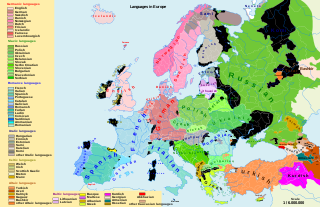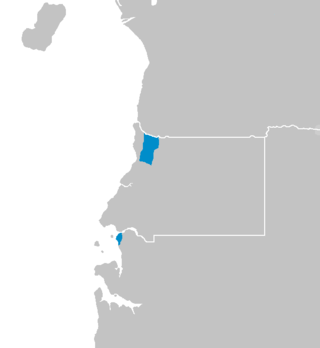Related Research Articles

There are over 250 languages indigenous to Europe, and most belong to the Indo-European language family. Out of a total European population of 744 million as of 2018, some 94% are native speakers of an Indo-European language. The three largest phyla of the Indo-European language family in Europe are Romance, Germanic, and Slavic; they have more than 200 million speakers each, and together account for close to 90% of Europeans.
Bube, Bohobé or Bube–Benga is a Bantu language spoken by the Bubi, a Bantu people native to, and once the primary inhabitants of Bioko Island in Equatorial Guinea. The language was brought to Bioko from continental Africa more than three thousand years ago when the Bubi began settling on the island.
The Kele language, or Lokele, is a Bantu language spoken in the Democratic Republic of the Congo by the Kele people.
Kota, or iKota, is a Bantu language spoken by the Bakota people. It is spoken in northeastern Gabon, Ogooué-Ivindo Province and in some areas of Republic of Congo. According to Ethnologue there are 34,442 Kota speakers in Gabon and 9,055 in the Republic of Congo.

Seki, also Baseke, Sheke or Sekiana, is a language indigenous to Equatorial Guinea and Gabon. It had been spoken in villages of Rio Campo and Northern Bata, along the coast, but its native speakers have begun abandoning the language for Spanish, Fang, and Kombe. Can be related to Kako spoken in the East region of Cameroon and some parts of the west of Central African Republic.

The Kwasio language, also known as Ngumba / Mvumbo, Bujeba, and Gyele / Kola, is a language of Cameroon, spoken in the south along the coast and at the border with Equatorial Guinea by some 70,000 members of the Ngumba, Kwasio, Gyele and Mabi peoples. Many authors view Kwasio and the Gyele/Kola language as distinct. In the Ethnologue, the languages therefore receive different codes: Kwasio has the ISO 639-3 code nmg, while Gyele has the code gyi. The Kwasio, Ngumba, and Mabi are village farmers; the Gyele are nomadic Pygmy hunter-gatherers living in the rain forest.
Baka is a dialect cluster of Ubangian languages spoken by the Baka Pygmies of Cameroon and Gabon. The people are ethnically close related to the Aka, collectively known as the Mbenga (Bambenga).However, the languages are not related, apart from some vocabulary dealing with the forest economy, which suggests the Aka may have shifted to Bantu, with an estimated 15000 people have shifted.
Bwisi is a language spoken mainly in the Kibangou District of the Republic of Congo, next to the Gabon border, where it is also spoken by a minority. According to the Ethnologue, approximately 4,250 people speak the language today worldwide.
West Teke is a Bantu language spoken in the Republic of Congo and Gabon.
Ngando is a Bantu language in the Soko-Kele languages group that is spoken by the Ngando people in the Democratic Republic of Congo.
The Lombo language is in the Kele language group of Bantu languages. It is spoken by the Turumbu people of the Tshopo District, Isangi Territory, in the Democratic Republic of the Congo.
spoken in Yala local Government area
Agusan is a Manobo language of northeastern Mindanao in the Philippines.
Vove is a Bantu language of Gabon.
Ndasa is a Bantu language spoken in Gabon and the Congo.
Wumbvu (Wumvu) is a Bantu language spoken in Gabon and the Congo.
Kaningi (Kaning'i) is a Bantu language spoken in Gabon. Speakers live in villages scattered among other peoples; the Bongo pygmies speak a distinct dialect.
Sake (Shake) is an undocumented and threatened Bantu language spoken in Gabon.
Wanzi (Wandji) is a Bantu language spoken in Gabon.
Duma is a Bantu language spoken in Gabon.
References
- ↑ West Kele, Bubi at Ethnologue (18th ed., 2015) (subscription required)
Ngom at Ethnologue (18th ed., 2015) (subscription required) - ↑ Jouni Filip Maho, 2009. New Updated Guthrie List Online
- ↑ "Kélé A language of Gabon". Ethnologue. Retrieved 2011-10-25.
- 1 2 3 Bingoumou, Justin (2008). Esquisse phonologique du ntumbidi parlé à Rébé (MA thesis). Libreville: Université Omar Bongo.